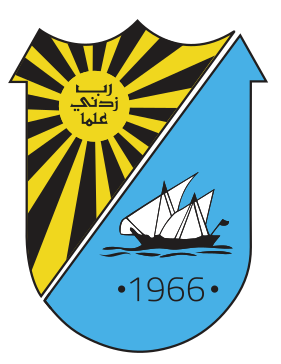Program Description
Students can enroll in a thesis or project option to complete their degree requirements. The program requires 10 compulsory credit hours for the thesis option and 13 for the project option. Students in the thesis options must choose 12 elective credit hours from the courses provided by the program. Students in the project option are required to complete 21 elective credit hours and take the comprehensive examination.
Program Director
Dr. Hosam Aboelfotoh
Graduate Program Educational Objectives
- Students acquire deep understanding and skills in a broad range of computer science
areas. - Students are prepared to pursue a Ph.D. degree, solve research problems, and produce
high-quality publications in a computer science area. - Students are engaged in life-long learning and continuously seek professional
development, and promote technological advancement.
Graduate Program Student Learning Outcomes
- Perform independent investigations to identify research problems and analyze the
related literature. - Identify and analyze computer science theoretical and applied research problems and
develop novel solution approaches. - Design, implement, and evaluate computing-based solutions to meet a given set of
computing requirements. - Perform systematic experimental evaluations or rigorous analysis to develop evidence
on the correctness of solutions. - Function effectively as a member or leader of a team engaged in activities appropriate
to the program’s discipline.
Admissions
To apply for the graduate program in computer science, please follow the announcements by the College of Graduate Studies at Kuwait University. The College makes all final admission decisions of Graduate Studies.
As of the recent admission requirements, the department accepts applications from students with a bachelor's degree in any science, engineering, or business administration, requiring at least one programming course with a minimum grade of B.
Frequently Asked Questions
Q. Where can I find regulations regarding the graduate program?
COGS By-Laws published in cogs web site الماجستير الباب الثالث ص 8:
http://kuweb.ku.edu.kw/cs/groups/cogs/documents/ku_content/kuw216964.pdf
Q. Which courses should I register for this semester?
If this is the fall semester, you should register for the compulsory course (0418512) and one elective (if you are part-time) or two electives (if you are full-time). If this is the spring semester, you should at least register for the two compulsory courses (0418513 and 0418521).
For Conditionally accepted students, you must pass your conditional courses in your first registration term with a grade of B or more.
Q. What is the minimum load I can register in?
According to By-Laws:
- Part-time students should register in 5- 9 units.
- Full-time students should register in 8-15 units.
- Registering in less than the minimum load may result in the college canceling your schedule.
Q. What are the M.Sc. options?
Two options are available for M.Sc. in Computer Science:
- Thesis option: 7 courses + Thesis
- Project option (10 courses + Project + Comprehensive Examination).
- A 1-credit seminar course for both options.
The Thesis requires an extensive survey of the state-of-the-art of one of the topics (chosen by you and your supervisor) and doing some original (publishable) research. You can register for the Thesis after passing 12 credits.
The courses include three compulsory courses (CS512, offered in the Fall, and CS513 and CS521 in Spring). The rest are elective courses, which you can choose from the offered courses by the department (graduate courses 500 level). Please refer to check the course descriptions (also, the College of GS distributes a Graduate Catalogue for newly admitted students).
Program Requirements
Compulsory
| 0418–512 | Automata and Formal Languages |
| 0418–513 | Theory of Complexity |
| 0418–521 | Programming Paradigms |
| 0418–590 | Research Seminar in Computer Science |
| 0418–593 | Project (non-thesis option only) |
| 0418–597, 598, 599 | Thesis (Thesis Option Only) |
Electives
| 0418–511 | Algebraic Structures and Logic |
| 0418–514 | Principles of Programming Languages |
| 0418–515 | Program Specification and Verification |
| 0418–516 | Graph Theory |
| 0418–522 | Distributed Systems |
| 0418–523 | Advanced Databases |
| 0418–524 | Expert Systems |
| 0418–525 | Operating Systems |
| 0418–526 | Advanced Computer Networks |
| 0418–527 | Interconnection Networks |
| 0418–534 | Parallel Computing |
| 0418–536 | Advanced Computer Graphics |
| 0418–541 | Advanced Artificial Intelligence |
| 0418–542 | Scientific Computing: Mathematical Models and Algorithms |
| 0418–543 | Advanced Numerical Computing |
| 0418–544 | Software Engineering |
| 0418–545 | Computer Systems Architecture |
| 0418–546 | Design of Microprocessor-based Systems |
| 0418–547 | Modeling and Computer Simulation |
| 0418–551 | Introduction to Cryptography |
| 0418–552 | Data Mining |
| 0418–553 | Information Theory |
| 0418–554 | Wireless and Mobile Networks |
| 0418–555 | Design and Test of Digital Systems |
| 0418–561 | Systems & Network Security |
| 0418–562 | Software Security |
| 0418–563 | Data Protection & Privacy |
| 0418–564 | Computational Biology |
| 0418–565 | Computational Medicine |
| 0418–566 | Machine Learning |
| 0418–567 | Algorithms for Optimization |
| 0418–580 | Topics in Computer Science |
